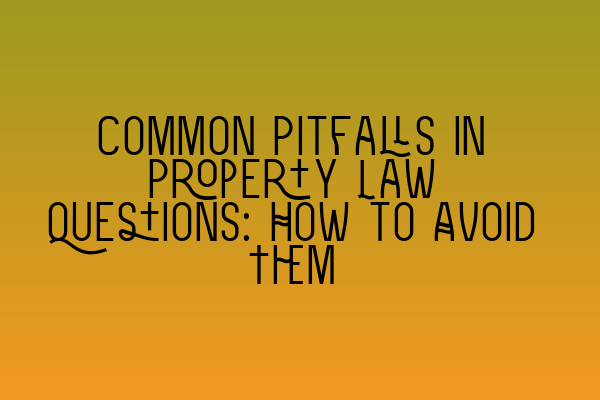Common Pitfalls in Property Law Questions: How to Avoid Them
Property law can be a complex and intricate area of law, with various principles and rules that must be carefully considered. Whether you are studying property law or practicing as a solicitor, it is crucial to be aware of the common pitfalls that can arise when tackling property law questions. In this blog post, we will discuss some of these pitfalls and provide you with tips on how to avoid them.
1. Failing to Identify the Correct Legal Estates and Interests
One common pitfall in property law questions is the failure to correctly identify the legal estates and interests involved. It is essential to carefully analyze the question and determine the nature and extent of the rights and interests in the property. This includes identifying the difference between freehold and leasehold estates and understanding the various interests that can be created, such as easements, covenants, and legal mortgages.
To avoid this pitfall, it is crucial to have a solid understanding of the relevant legal principles and concepts. Reviewing the related articles on our website, such as Interactive SQE Mock Tests for Contract Law: Test Your Knowledge and Parties in a Contract: Rights and Responsibilities, can help strengthen your knowledge and ensure you are familiar with the key terms and concepts.
2. Ignoring Statutory Provisions and Precedents
Another common pitfall is failing to consider the relevant statutory provisions and legal precedents. Property law is heavily influenced by legislation, such as the Law of Property Act 1925 and the Land Registration Act 2002. It is essential to be aware of these statutes and understand how they apply to the given scenario. Additionally, legal precedents and case law play a significant role in interpreting and applying the law.
To avoid this pitfall, make sure you conduct thorough research and stay up to date with the latest legal developments. Familiarize yourself with the relevant statutes and case law, and consider using online resources, textbooks, and legal databases to gain a comprehensive understanding. Our related articles on Unveiling Duress and Undue Influence in Contracts and Essentials of Consideration: Understanding the Backbone of Contracts might provide valuable insights into the importance of statutory provisions and precedents in property law.
3. Inadequate Application of Legal Principles
One of the most crucial aspects of property law questions is the application of legal principles to the given facts. It is not enough to merely state the legal principles; you must explain how they apply and analyze their impact on the scenario. Many students and practitioners fall into the trap of simply regurgitating the law without demonstrating their understanding and analytical skills.
To avoid this pitfall, practice applying legal principles to various scenarios. Engage in interactive mock tests, such as the ones provided in our article on Interactive SQE Mock Tests for Contract Law: Test Your Knowledge, to test your understanding and refine your application skills. Additionally, consider seeking feedback from experienced property law practitioners or tutors who can provide valuable insights and help you improve.
4. Overlooking Key Facts and Relevant Issues
One common pitfall in property law questions is failing to identify and address all the crucial facts and issues presented in the scenario. Often, questions contain subtle details that can have a significant impact on the outcome. Overlooking these facts or failing to consider them can result in incomplete or incorrect answers.
To avoid this pitfall, take the time to carefully read and analyze the question. Underline or highlight the key facts and issues, and ensure you address each of them in your response. It may also be helpful to create a checklist or an outline to keep track of the important points you need to cover.
5. Insufficient Explanation and Analysis
A common pitfall is providing answers that lack sufficient explanation and analysis. Merely stating an outcome or conclusion without supporting it with a clear rationale will not earn you full marks. Examiners and clients are looking for well-reasoned and persuasive arguments that demonstrate your understanding and analytical skills.
To avoid this pitfall, practice structuring your responses in a logical and coherent manner. Clearly state your position, provide a concise explanation of the relevant legal principles, and analyze how they apply to the given facts. Use examples, illustrations, and case law to support your arguments and demonstrate a deeper understanding of the topic. The related article on Damages in Contract Law: Assessing Financial Compensation might give you insights into how to present your explanation and analysis effectively.
Conclusion
Property law questions can be challenging, but by avoiding these common pitfalls and following the tips provided in this blog post, you can enhance your understanding and improve your chances of success. Remember to pay attention to the legal estates and interests, consider the relevant statutory provisions and precedents, apply the legal principles effectively, address all key facts and issues, and provide sufficient explanation and analysis in your responses.
For further assistance and resources, feel free to explore our website for more insightful articles and interactive mock tests!
